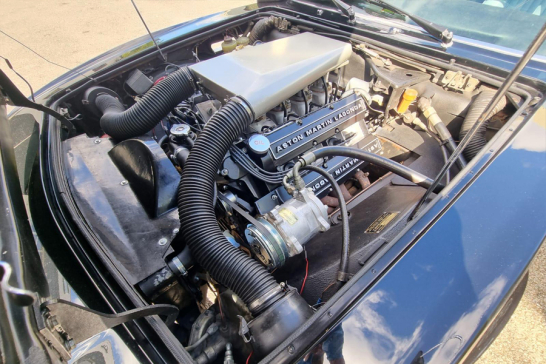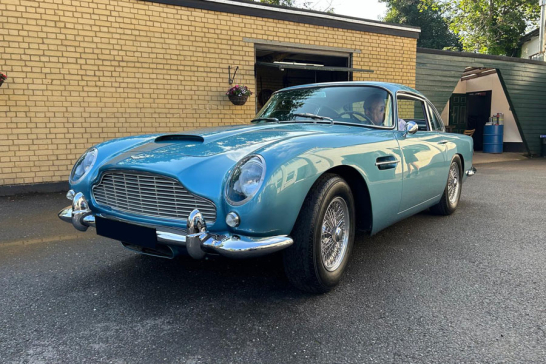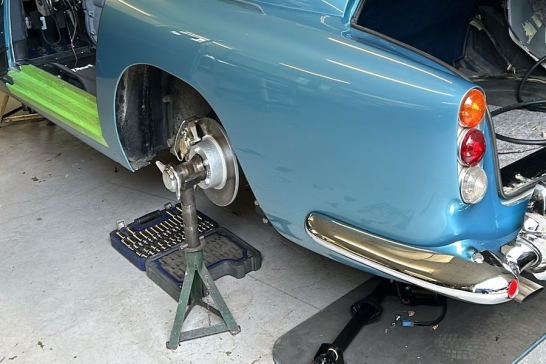Take a "debug" road test with us in this amazing DB5 we restored from a barn find; a car that made the press some 4 or 5 years ago. Like all Aston Martin restorations carried out by Pugsley & Lewis, we follow a strict process when it comes to debugging, and extensive road testing is the best way to uncover any anomalies that require attention. As Aston Martin specialists, we're fanatical about all our restorations so you'll appreciate the insights that came to light in this road test, as well as enjoying the conversation along the way!
Read The Transcript
- So, this car's just finishing the mechanical restoration?
- [Tim] Yep.
- [Tim] We're road testing it to start the debug, really of all the little bits and pieces that need to be, like, the speedo's flickering here.
- Okay.
- [Tim] Even before I got to the end of the yard!
- So, take me through what's been done to this car and, you know, how long's it been in the workshop, and what's a little bit of history with it.
- [Tim] Well, this is a DB5 that was a barn find that was in the press three or four years ago. And we've tried, there were some really good aspects of it, which was the interior, the leather work is all original. It's got patina, it's not like new. But we tried to keep stuff like that. We changed carpets, but the original leather, we got that typical Aston smell.
- Yeah.
- [Tim] Which I remember, when I first started working on Astons, opening a door of an Aston and smelling that smell. It's still got it in this car. There aren't many cars that still got that smell left. You know, 'cause they've been re-trimmed and time's moved on.
- Sort of hits you when you open the door, doesn't it?
- [Tim] Yeah. That's quite unusual. But it's had full mechanical rebuild. New engine gearbox suspension brakes, chassis, which wasn't that bad.
- So, the sort of thing, what you're looking for? You mentioned a minute ago that the speedo was flickering a little bit, so..
- [Tim] Yeah.
- That's obviously part of the debugging process, but in terms of the actual drive, what are you, 'cause you know these cars inside out, what are you particularly looking for when you...
- [Tim] Everything. Absolutely everything. But, you know, noises from the suspension, the brakes, if there's pulling, or I know it shouldn't be after, but there's always something, or quite a lot of little bits and pieces that--
- Yeah.
- [Tim] Anything that detracts from...
- The pleasure of driving, mm-hmm.
- [Tim] Makes it more, if there's anything that makes it difficult to drive.
- Yeah.
- [Tim] You know, work out what was happening and stop it.
- Yeah.
- [Tim] And everything till it works properly. There's a piece of hill here that's gonna go up, it's a good... good little test for the engine, you know, for tuning of the engine.
- Yeah.
- [Tim] Puts a bit of load on it. But, if you're gonna get a misfire, you will normally get it around there.
- Yeah.
- [Tim] And that was fine, we didn't get any of that.
- And this car's a little bit unusual in that it's not had any paint job, has it? They've stuck with the original..
- [Tim] Yeah.
- ..finish and the original paint work on the car.
- [Tim] Yeah.
- Which is sort of a trend, really. It's kind of, there's more people looking at this originality.
- [Tim] It's not necessarily a trend with Astons at the moment, it's more, you know, in the classic car world, there are more people appreciating that original patina that you can't buy.
- Yeah.
- [Tim] Or it's difficult to re-enact. But it's starting to spread, that kind of thing. This owner would like to keep this patina at the moment, he might change his mind.
- Yeah.
- [Tim] But he'll use the car and see how it goes. See if he really likes it like that or he'll repaint it. Dunno, it's up to him, it's his choice.
- Yeah. Is there anything else that you've picked up on this short drive that you're not quite happy with, is there anything; I know this isn't the first debugging session you've had and the first drive, so.
- [Tim] No, we're pretty much there, to be honest.
- Yeah.
- [Tim] The engine tuning is now really lovely and the clutch is lovely and smooth, because the engine's working smoothly.
- Yeah.
- [Tim] Quite a lot of Astons have a juddery clutch, and half of it's due to tuning not being as good as it could be.
- Sure, yeah.
- [Tim] You'll use more revs to pull away and that won't do any favors to the clutch, you know, make it more juddery.
- Yeah.
- [Tim] And the gearbox is nice, but it's, because it's been rebuilt, it's a bit tight. But it's freeing it. When it was cold, they're renowned, these ZF gearboxes, for being quite tight when they're cold, and because it's just been rebuilt, it is - but, you know, I've done probably 40 miles in this, and it's already feeling good.
- Yeah.
- [Tim] Feeling a lot more different than when I first went out in it.
- Doesn't feel like you're having to work particularly hard to get a nice smooth drive out the car.
- [Tim] That's the trick of a good rebuild - is making it an easy thing to drive rather than something you have to fight with.
- Yeah.
- [Tim] And a lot of people think, "It's an old car, "you gotta fight it."
- Yeah. But if you have, then something's wrong. Well, lots of things are wrong.
- Yep.
- [Tim] If you get them right, then they are easy to drive. Our business is in Beckenham, which is on the border of London and Kent. And obviously, there's quite a lot of traffic around here.
- Yeah.
- [Tim] Nothing like in London, it's right in the middle of London, but that's a good test anyway, you know, when you come out for road testing, it's a good test to drive in traffic and these sort of roads.
- Yep.
- [Tim] And, you know, within 20 minutes, we can get to the A20 and get on motorways and A roads and stuff, so--
- Yeah.
- [Tim] It's a good, we're in a good place to do all sorts of road testing and debugging. Now, I've got various routes that I use to try different, you know, to put the car under different pressures.
- Sure.
- [Tim] Or different suspension or brakes or engine. If you don't like driving it, you're just not going to use it.
- Yeah.
- [Tim] Which is a shame. You know, so many lovely cars don't get used.
- Probably 'cause they look really nice but they don't have any place to drive.
- [Tim] Yeah, there is that, but also, obviously, for value these days, people do get concerned that..
- Yeah.
- [Tim] ...they cost so much. And the other thing is, modern cars are so easy to drive now.
- Yeah.
- [Tim] So, like in this car, DB5, on SUs, you gotta use the choke, which people haven't had to use chokes for years!
- You know, that's right.
- [Tim] And fewer people are having to use clutches and gearboxes now, so the younger generation coming along, it's kind of a different ballgame to get an old contraption, if you like. Now, 'cause it's a new engine, you don't wanna rev it too much.
- What do you recommend for running in with rebuilt engines, these engines?
- [Tim] What, revs?
- Yeah.
- [Tim] Not really going over 3,000, and definitely don't hold it at higher revs, like motorway constant revs is not great for a new engine.
- No. And in terms of oil change when the engine's been rebuilt? I mean, is it after 1,000 miles and then another 2,000 miles I mean, what do you recommend? What do you normally do?
- [Tim] We like to re-torque the engines, 'cause all the gaskets are old fashioned and a lot of them do need re-torquing before oil leaks start.
- Yeah.
- [Tim] And that, we generally say like a year, or 600 miles, whichever comes first, 'cause in a modern car, that comes quickly if you use it every day.
- That's right.
- [Tim] But in a classic, it's not used very much, it can be a year, so yeah. 600 miles; it's a combination of time, really, and mileage.
- Yeah. But yeah, along those lines, a year or 600 miles, whatever's first, or--
- Okay. Yeah, and what about, you know, innovations with things like engine oil? I mean, do you use modern engine oil in these cars, or are you using some of the oil that's created for classic cars and motorbikes, I mean, what do you...
- [Tim] Basically, it's 20-50, which is what they originally had.
- Okay.
- [Tim] There are other bits and pieces in the oils these days, they're clever, you know, to keep stuff clean inside, you know, detergents and things. That's no problem, using any of that. But you don't use the lower viscosity oils that are in all the modern cars now.
- No.
- [Tim] You don't use that, because they won't do the job well enough. They do need thicker oils, you know? You get wear on tap-it cups, everything in the cylinder head with the thinner oils, 'cause the clearances are bigger, they flap around and wear much quicker.
- Okay.
- [Tim] You get oil burning with the modern oils through piston rings, 'cause clearances for the older engines are bigger, so when the modern oils are thinner, they're much more adept at getting through those smaller clearances and getting away.
- Okay, yeah. And modern synthetic oils, a no-no?
- [Tim] Well, they're very good for, it's basically about clearances.
- Yeah.
- [Tim] You know, if you put a modern oil, engine oil in here with a lower viscosity, the oil pressure will disappear, will be probably affected by 1/3, so, what you're looking for on these engines is 85 pounds per square inch or 3,000 revs. That's something that Aston Martin said, that's what you need to have.
- Okay.
- [Tim] And everyone kind of goes by that. But you really don't want more than that, 'cause then you start end up washing away bearings and too much oil pressure can be not good either, so--
- Yeah, okay.
- [Tim] But anyway, so, with a lower viscosity engine, when it gets hot, say you're on a motorway on a sunny day, and you've been on there for an hour, the oil pressure will drop significantly, because it's...
- The oil's just got really thin?
- [Tim] Not so much that the engine has expanded, they're aluminium blocks.
- Yeah.
- [Tim] And the engine's expanded, so the clearances have got even bigger.
- Okay.
- [Tim] It's not so much the oil's not up to the job, so, really, but you are losing oil pressure, which is not a great thing.
- Mm-hmm. So, having been out in this one just now, I mean, what are you thinking, how much more work till you're happy with it, do you think?
- [Tim] Very little, there's a little rattle there, don't know if you heard that?
- Yeah.
- [Tim] On the throttle pedal, so we just need to adjust that to get that rattle out of that.
- Yeah.
- [Tim] There's the speedo flickering away. The engine's performing really nicely on small throttles up a hill, it's totally smooth, but there's not much left at all.
- No.
- [Tim] From a driving point of view.
- Yep.
- [Tim] One of the few things we did fit to this is electronic power steering.
- Okay.
- [Tim] Which just makes them so much more nimble around corners. It's not about - to me, it's not about parking, whether it helps; it's more about the nimbleness on small roads, you know, little country roads, windy roads.
- Yeah.
- [Tim] It just makes, keeps up with the traffic, just a much more pleasurable drive.
- Yeah.
- [Tim] You can turn it off as well, we put the button under here, under the dashboard, so you hardly see anything.
- Sure, and so, an Aston DB5 that hadn't been given the Pugsley & Lewis treatment, this journey we've just been doing, it would be different, it would be harder, you'd be working harder, do you think? It would just be less pleasurable?
- [Tim] We're not the only people who do a good job, but there are a lot of companies that if, basically, if they're not an Aston specialist, if you're not a specialist in any make, you can't know all the little things that are problematic with them.
- That's right.
- [Tim] So, that's the difference, really, isn't it? If it makes it a nice drive in the end.




